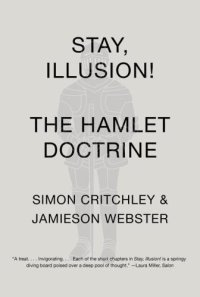
Ebook: Stay, Illusion!: The Hamlet Doctrine
- Tags: DRAMA--English Irish Scottish Welsh, Literary criticism, Influence (Literary artistic etc.), Electronic books, Shakespeare William -- 1564-1616. -- Hamlet, Shakespeare William -- 1564-1616 -- Influence, Hamlet -- (Legendary character), Shakespeare William -- 1564-1616, Hamlet (Shakespeare William), DRAMA -- English Irish Scottish Welsh
- Year: 2013
- Publisher: Knopf Doubleday Publishing Group
- City: New York
- Edition: 1st ed
- Language: English
- azw3
Praise be rashness -- The gap between thought and action -- The mouse-trap -- Let be -- Bunghole -- The Gorgiastic paradox of theater -- Ass, ho, hum -- In nothing must -- By indirections find directions out : Carl Schmitt's Hamletization -- This globe of spies -- He is not a nice guy : Hamlet as prince and political threat -- Is Hamlet a tragedy or a Trauerspiel? -- The mute rock of reality -- Walter Benjamin's slothful, pensive melancholy -- Is Hamlet a Christian tragedy? -- Do it, England -- Germany is Hamlet, and Hamlet is Germany -- A fault to heaven -- Unbearable contingency : Hegel's Hamlet -- Hegel likes a happy ending -- Hamlet is a lost man -- Hamletizing psychoanalysis -- Rebecca, take off your gown : Freud and Fliess -- I have bad dreams -- Psychoanalysts eat their young -- Get thee to a nursery -- Hamlet's mourning and melancholia-- A happiness that often madness hits on -- At every moment absolutely stupefied : Lacan bites the carpet -- That is Laertes, this is Hamlet -- The image of my cause I see : Hamlet and the mirror -- Ophelia, or, The sexual life of plants -- The moneying of love -- Thou common whore and visible God -- Gertrude, a gaping cunt -- Mother, Mother, Mother -- Step between her and her fighting soul -- Who calls on Hamlet? -- Nietzsche contra Nietzsche -- Spectatorial distance -- Lethargy and disgust -- Who asked you to swallow men like oysters, Prince Hamlet? -- Through the ghost of the unquiet father, the image of the unliving son looks forth -- I want to be a woman -- Absolutely-too-much --- O, O, O, O. Dies -- I will gain nothing but my shame -- The most monstrous contradiction of love.;The figure of Hamlet haunts our culture like the ghost haunts Shakespeare's melancholy Dane. Arguably, no literary work is more familiar to us. Everyone knows at least six words from Hamlet, and most people know many more. Yet the play'Shakespeare's longest'is more than "passing strange," and it becomes even more complex when considered closely. Reading Hamlet alongside other writers, philosophers, and psychoanalysts'Carl Schmitt, Walter Benjamin, Freud, Lacan, Nietzsche, Melville, and Joyce'Simon Critchley and Jamieson Webster go in search of a particularly modern drama that is as much about ourselves as it is a product of Shakespeare's imagination. They also offer a startling interpretation of the action onstage: it is structured around "nothing"'or, in the enigmatic words of the player queen, "it nothing must." From the illusion of theater and the spectacle of statecraft to the psychological interplay of inhibition and emotion, Hamlet discloses the modern paradox of our lives: how thought and action seem to pull against each other, the one annulling the possibility of the other. As a counterweight to Hamlet's melancholy paralysis, Ophelia emerges as the play's true hero. In her madness, she lives the love of which Hamlet is incapable. Avoiding the customary cliches about the timelessness of the Bard, Critchley and Webster show the timely power of Hamlet to cast light on the intractable dilemmas of human existence in a world that is rotten and out of joint.
Download the book Stay, Illusion!: The Hamlet Doctrine for free or read online
Continue reading on any device:

Last viewed books
Related books
{related-news}
Comments (0)